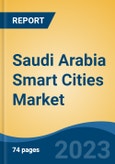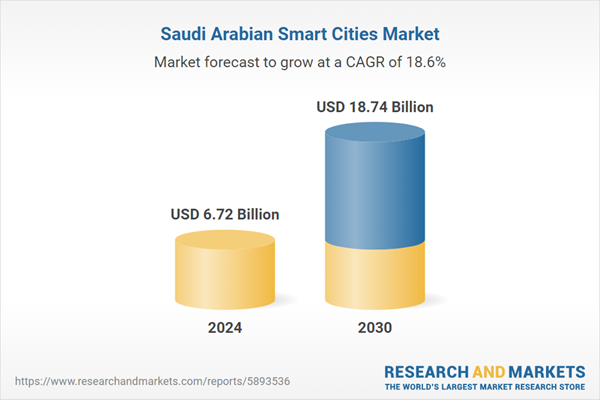Speak directly to the analyst to clarify any post sales queries you may have.
10% Free customizationThis report comes with 10% free customization, enabling you to add data that meets your specific business needs.
These cities use advanced technologies such as the Internet of Things, artificial intelligence, cloud computing, and smart grids to optimize traffic, energy, water, waste, security, and citizen engagement. Landmark projects like NEOM, The Line, and the Red Sea Project showcase the Kingdom’s ambition to redefine modern urban living through smart technologies.
The smart cities market in Saudi Arabia is poised for rapid growth, driven primarily by the government’s Vision 2030, which prioritizes digital transformation, sustainability, and diversification of the economy beyond oil. Massive investments in infrastructure, smart mobility, renewable energy, and digital governance are laying the foundation for future-ready cities. Public-private partnerships, regulatory reforms, and a favorable investment climate are encouraging global and local technology providers to participate in the transformation.
Key Market Drivers
Vision 2030 and Government-led Urban Transformation
Saudi Arabia’s Smart Cities Market is significantly driven by the national Vision 2030 initiative, which positions digital transformation and urban sustainability at its core. With government funding focused on diversifying the economy and enhancing urban living standards, smart city projects such as NEOM, The Line, and Qiddiya are flagship examples of how public investment is enabling a modern, connected infrastructure base. These developments are not just urban expansions; they are being built from the ground up with digital-first strategies.The government’s strategic focus includes smart transportation systems, intelligent energy grids, and integrated citizen services that reduce operational costs while improving quality of life. Public-private partnerships are also being fostered to accelerate smart city rollouts. With ministries actively collaborating with global technology leaders and standards being enforced through the Saudi Data and Artificial Intelligence Authority (SDAIA), the country is laying a strong foundation for long-term scalability and investment in smart cities. By 2024, the Saudi government allocated over USD 500 billion to megacity and smart infrastructure projects under Vision 2030, including NEOM and The Line, according to public investment data. These figures illustrate the Kingdom’s unmatched scale of investment in next-generation urban ecosystems, providing long-term growth opportunities for the smart cities market.
Key Market Challenges
Data Privacy and Cybersecurity Risks
One of the foremost challenges facing the Saudi Arabia Smart Cities Market is ensuring robust data privacy and cybersecurity frameworks. As smart cities heavily rely on the Internet of Things, cloud computing, and interconnected digital platforms, the volume of sensitive data being collected and processed grows exponentially. This data includes personal information of residents, critical infrastructure operations, and real-time monitoring systems, all of which present attractive targets for cyberattacks. Ensuring data confidentiality, integrity, and availability is crucial to maintain citizen trust and avoid disruptions that could have significant social and economic consequences. The evolving nature of cyber threats requires continuous investment in advanced security technologies, staff training, and adaptive regulatory policies.Saudi Arabia’s regulatory environment around data sovereignty and privacy is still maturing, which poses a challenge to seamless deployment of international smart city technologies. Balancing innovation with compliance to emerging local data protection laws requires coordinated efforts between government entities, private sector participants, and technology providers. The lack of standardized cybersecurity protocols across sectors can also hinder the integration of disparate systems within smart city ecosystems, creating vulnerabilities. Addressing these risks effectively demands a comprehensive approach that includes legislative measures, technological safeguards, and public awareness campaigns to foster a secure digital urban environment.
Key Market Trends
Integration of Artificial Intelligence and Data Analytics for Urban Management
The adoption of artificial intelligence and advanced data analytics is transforming urban management within Saudi Arabia’s smart cities. These technologies enable city planners and administrators to harness vast volumes of data generated from sensors, public services, and citizen interactions. By leveraging machine learning algorithms and predictive analytics, cities can optimize resource allocation, improve traffic management, and enhance emergency response times. The integration of AI-driven platforms is also facilitating smarter energy consumption and waste management, contributing to sustainability goals and operational efficiency.Furthermore, AI applications extend beyond operational improvements to enhancing citizen engagement and personalized services. Intelligent chatbots and digital assistants provide residents with real-time information, service requests, and feedback channels, creating a more responsive and connected urban environment. As these technologies mature, their role in predictive maintenance, security surveillance, and urban planning will deepen, positioning Saudi Arabia’s smart cities as global leaders in digital governance and innovation.
Key Market Players
- Saudi Telecom Company
- NEOM Company
- Siemens AG
- Honeywell International Inc.
- Schneider Electric SE
- Cisco Systems, Inc.
- IBM Corporation
- Huawei Technologies Co., Ltd.
Report Scope:
In this report, the Saudi Arabia Smart Cities Market has been segmented into the following categories, in addition to the industry trends which have also been detailed below:Saudi Arabia Smart Cities Market, By Component:
- IoT Devices & Sensors
- Communication & Network Infrastructure
- Cloud & Edge Computing
- AI & Analytics
- Others
Saudi Arabia Smart Cities Market, By Application:
- Smart Mobility & Transportation
- Smart Utilities/Energy
- Public Safety & Surveillance
- Smart Buildings & Infrastructure
- Environmental Monitoring
- Others
Saudi Arabia Smart Cities Market, By Region:
- Northern & Central
- Southern
- Eastern
- Western
Competitive Landscape
Company Profiles: Detailed analysis of the major companies present in the Saudi Arabia Smart Cities Market.Available Customizations:
With the given market data, the publisher offers customizations according to a company's specific needs. The following customization options are available for the report.Company Information
- Detailed analysis and profiling of additional market players (up to five).
This product will be delivered within 1-3 business days.
Table of Contents
Companies Mentioned
- Saudi Telecom Company
- NEOM Company
- Siemens AG
- Honeywell International Inc.
- Schneider Electric SE
- Cisco Systems, Inc.
- IBM Corporation
- Huawei Technologies Co., Ltd.
Table Information
| Report Attribute | Details |
|---|---|
| No. of Pages | 70 |
| Published | September 2025 |
| Forecast Period | 2024 - 2030 |
| Estimated Market Value ( USD | $ 6.72 Billion |
| Forecasted Market Value ( USD | $ 18.74 Billion |
| Compound Annual Growth Rate | 18.6% |
| Regions Covered | Saudi Arabia |
| No. of Companies Mentioned | 8 |









